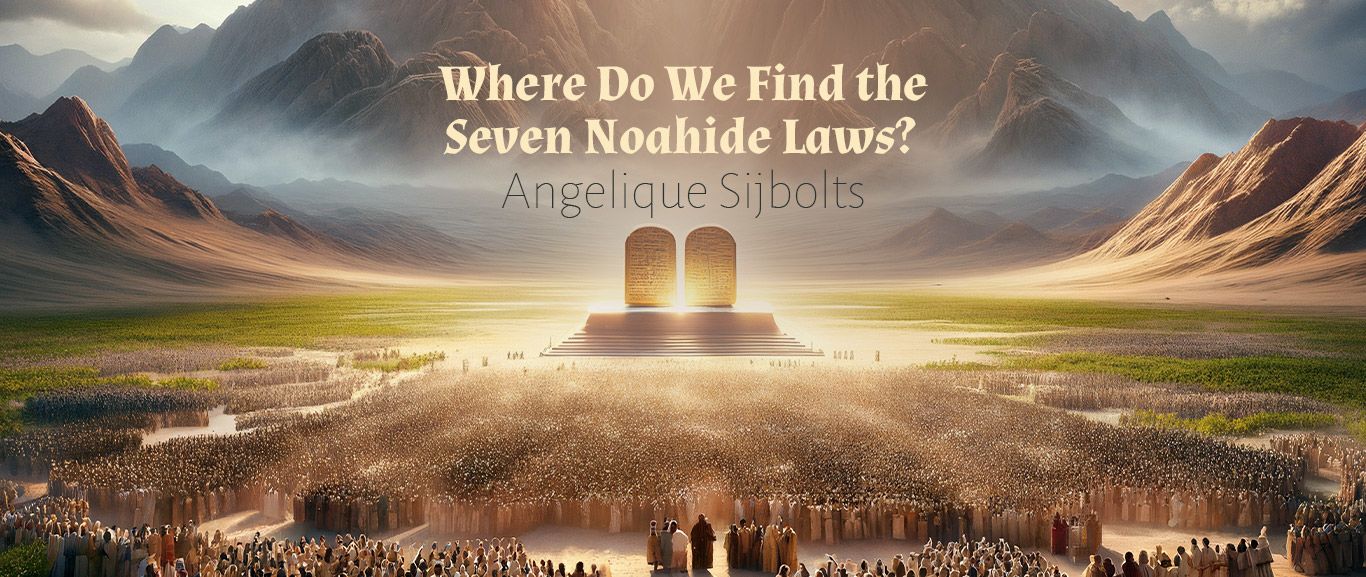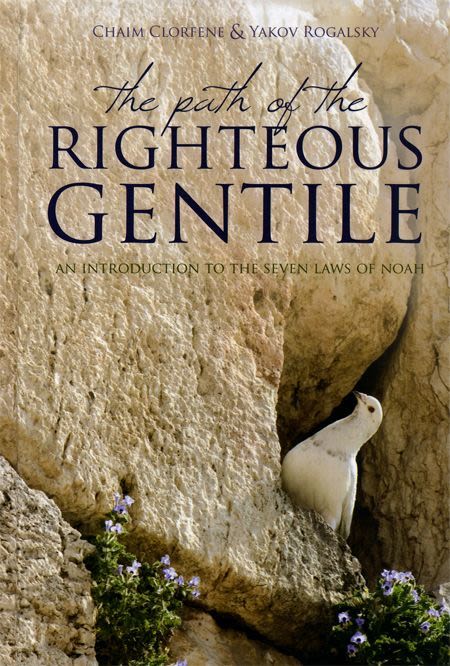
Where Do We Find the 7 Noahide Laws?
The Ten Commandments are clearly recorded in Shemot (Exodus 20:2 - 14), but what about the Seven Noahide Laws?

Torah Portion Mishpatim (Exodus 21:1-24:18)
Following the revelation at Sinai, G‑d legislates a series of laws for the people of Israel. These include the laws of the indentured servant; the penalties for murder, kidnapping, assault, and theft; civil laws pertaining to redress of damages, the granting of loans, and the responsibilities of the “Four Guardians”1; and the rules governing the conduct of justice by courts of law.
For Noahides
וְאֵ֙לֶּה֙ הַמִּשְׁפָּטִ֔ים אֲשֶׁ֥ר תָּשִׂ֖ים לִפְנֵיהֶֽם׃
“These are some of the laws that you shall set before them”. (Exodus 21:1)
While Moses was still on the Mount Sinai, G-d gave him the general outline of all the Torah’s commandments. In this context, He repeated the legal code that He gave the people at Marah and that Moses reviewed before the giving of the Torah. By repeating these laws on Mount Sinai, God endowed them with the same legal force as the rest of the Torah. He also taught Moses the details of the commandments in the following section. Inasmuch as the details of these laws are too complex to learn in only forty days, G-d “gave” Moses a full understanding of them on the last day. G-d gave the details of the rest of the commandments (with a few exceptions) between Tishrei 10, 2449, when Moses descended Mount Sinai, and Iyar 20, 2449, when the people began their journeys.
When were the 7 Mitzvot Given?
The Master of the Universe commanded Adam, the first man, on the day of his creation, as it says (Genesis 2:16), “And the L-rd G-d commanded ‘man’ (Adam) …” Hashem commanded six precepts to Adam:
- the prohibition against worshiping false gods;
- the prohibition against cursing Hashem’s Name;
- the prohibition against murder;
- the prohibition against specific forbidden sexual relations;
- the prohibition against theft;
- the commandment to live according to these laws (establish laws and courts of justice).
The Creator added to these when He commanded Noah not to eat flesh that was removed from a living animal, as it says, “And Hashem blessed Noah, … But flesh, with its soul in its blood you should not eat.” (Genesis 9:1,4)
Reaffirming the Noahide Laws at Mount Sinai
At Mount Sinai, Hashem commanded them [Israelites] with specific details from part of the eternal Torah of Moses.
1st day / Ex. 19:1-2. The Israelite nation encamped at Mount Sinai on the 45th day after God led them out in their exodus from slavery in Egypt.
2nd day / Ex. 19:3-8. Moses ascended to the top of Mt. Sinai to receive instructions from G-d, and then he descended. The Israelites agreed that they would obediently enter the Jewish covenant, when they said, “Everything that G-d has spoken we shall do!”
3rd day / Ex. 19:8 Starting from “Moses brought back the words of the people to God” up to Ex. 19:9 “…and they will believe in you Moses, also forever”. Moses then ascended Mt. Sinai again, reported to God, received His next instructions, and then descended.
4th Day/ Ex. 19:9 Starting from “Moses told the words of the people to G-d” to Ex. 19:14, and then the continuation skips to Ex. 24:1-4 through “Moses wrote all the words of G-d”. Moses ascended Mt. Sinai again to receive instructions from G-d and descended to tell the people all the Divine laws that had been commanded up until that time. The recounting and recording of the Seven Noahide Commandments by Moses took place at Mount Sinai on this day, two days before G-d spoke openly to the entire Jewish nation. In Ex. 24:3, it says “Moses came and told the people all the words of G-d and all the laws…” Here, “all the laws” refers to the Seven Noahide Commandments and a few of the Jewish Commandments, all of which the Israelites had already been commanded before they arrived at Mt. Sinai. Moses told these commandments to the Israelites at Marah, after they crossed through the sea – see Exodus 15:25.
5th day / Ex. 24:4 Starting from “He [Moses] arose early in the morning…” to Ex. 24:11. This is the day that Moses built an altar and read to the people the “Book of the Covenant” (the Book of Genesis, including the Seven Noahide Commandments, and part of Exodus up to that point).
6th day / Ex. 19:16-20:18, and Ex. 24:12-15. G-d openly spoke 10 of the 613 Jewish Commandments to the people, and Moses then ascended Mount Sinai to learn more of the Jewish Commandments from G-d for 40 days and 40 nights. (Many of these Jewish commandments are recorded in Ex. 20:19 to Ex. 23:22.)
The Significance of Sinai
The significance of Sinai is that Hashem then reaffirmed the 7 mitzvot. Further, Hashem commanded Moses to compel all nations of the world to observe the seven Noahide precepts that they had been commanded. Anyone who accepts these 7 Mitzvot and observes them and their details to the best of their ability is called pious (chassid) of the nations and has a share in the World to Come.
The significance of Sinai is also that Hashem sealed the Mitzvot then, meaning that nothing could be added or touched, including the 7 Mitzvot. Anyone who adds or subtracts – Jew or non-Jew – makes for himself a new religion, which is forbidden.
Sources:
- Chabad: Mishpatim in a Nutshell
- Kehot Chumash: Mishpatim
- The Divine Code by Rabbi Moshe Weiner and Dr. Michael Schulman 4th edition pgs. 28,44, and 57
- Orach Chaim Study-Program in Noahide Academy
Editor’s Note:
1 To understand who the “Four Guardians” are, see Whose Life is it Anyway?
***
Used with kind permission of Noahide Academy of Israel, the #1 online Jewish Academy for everyone. Study the Torah’s Noahide Code with our expert Rabbis and connect with a global community!








Tell us what you think!
Thank you for your comment!
It will be published after approval by the Editor.